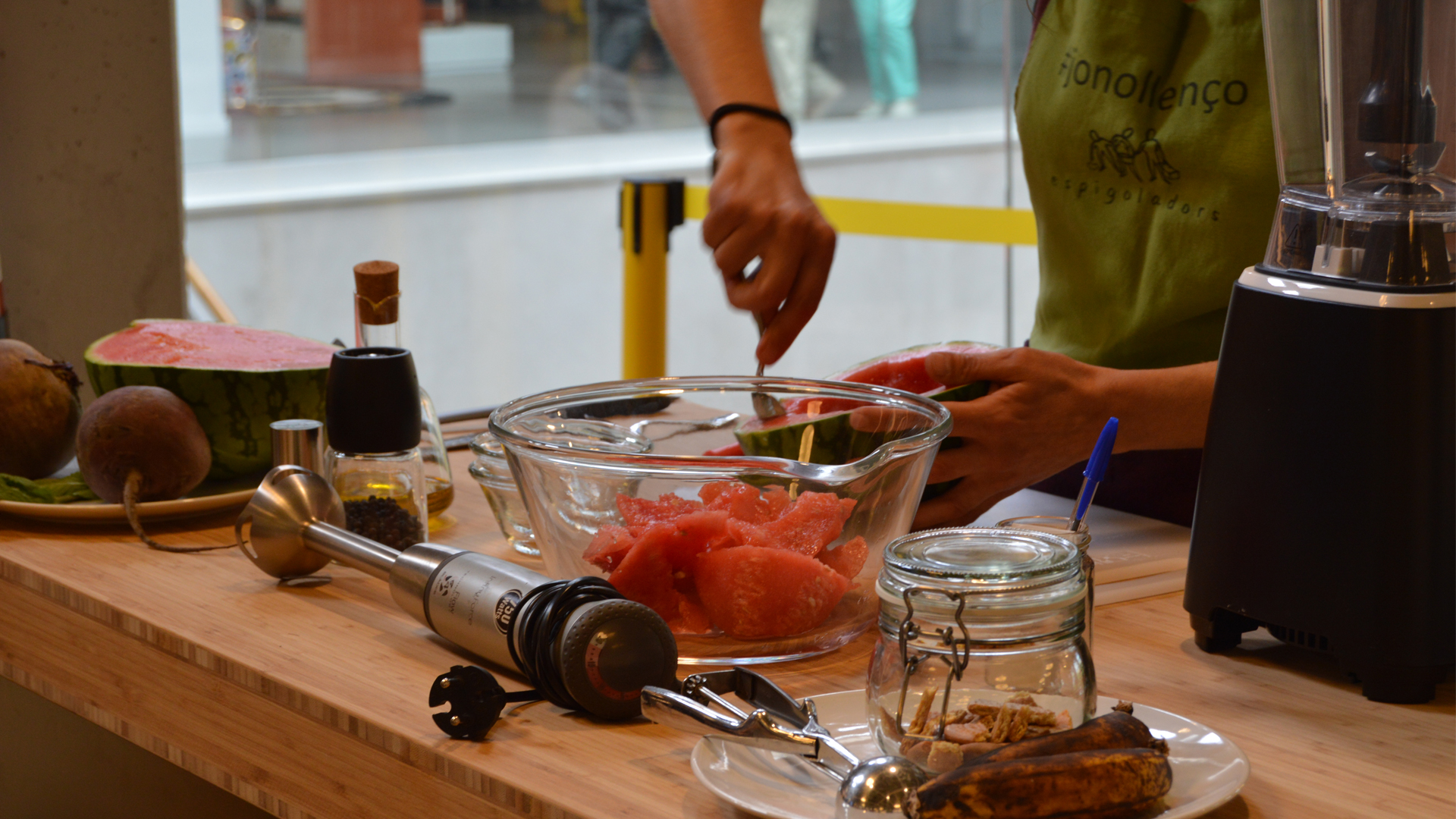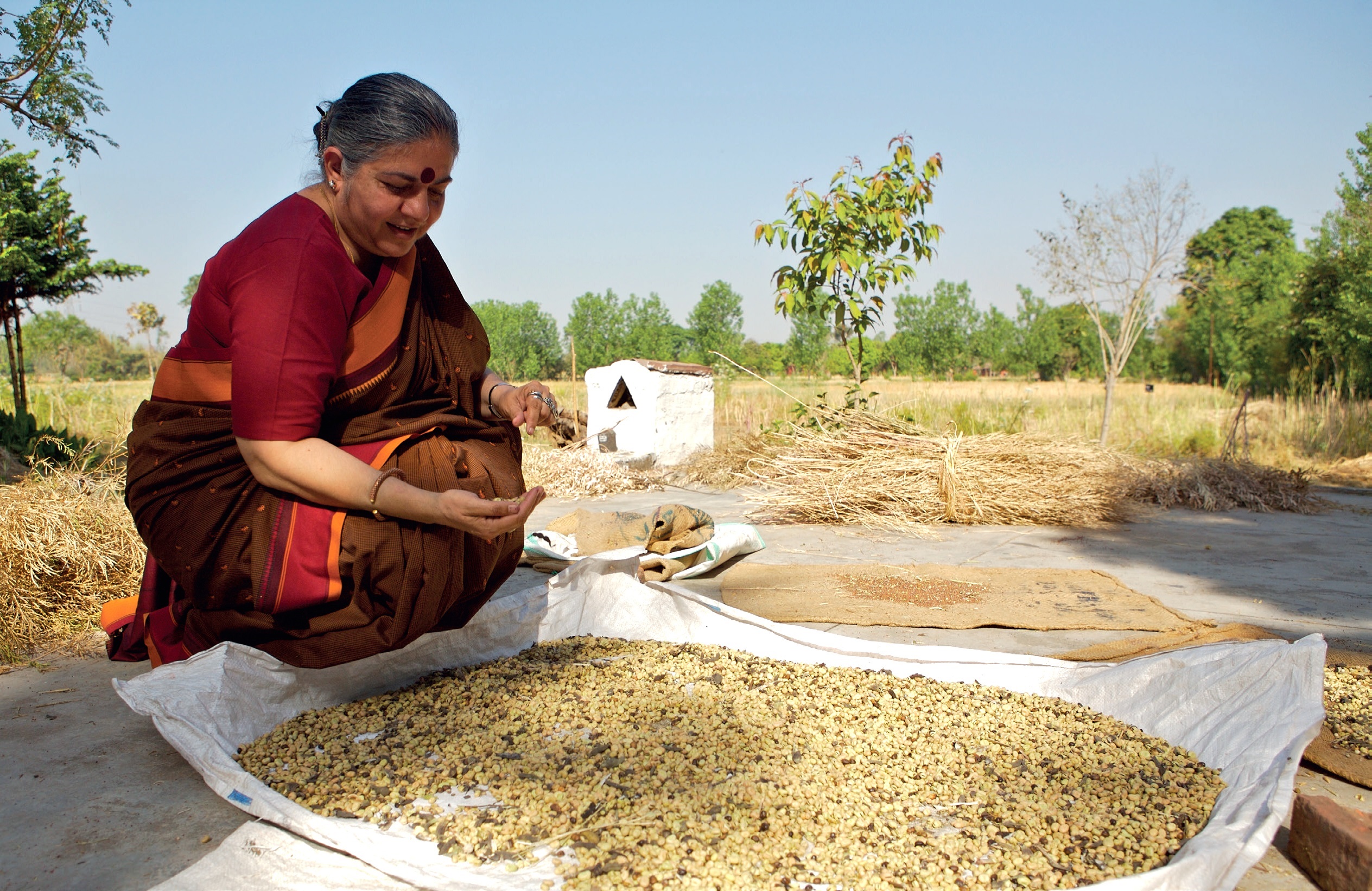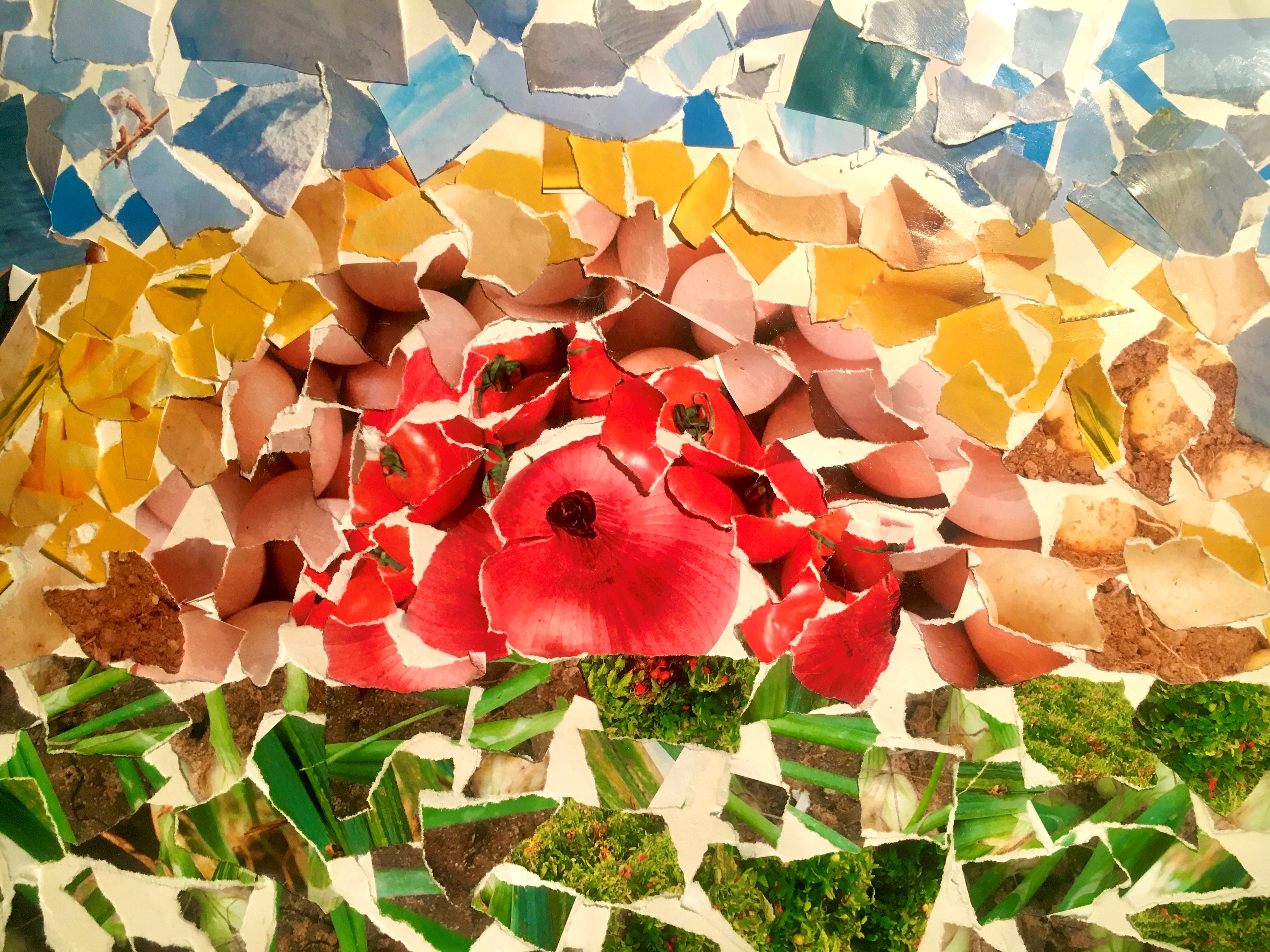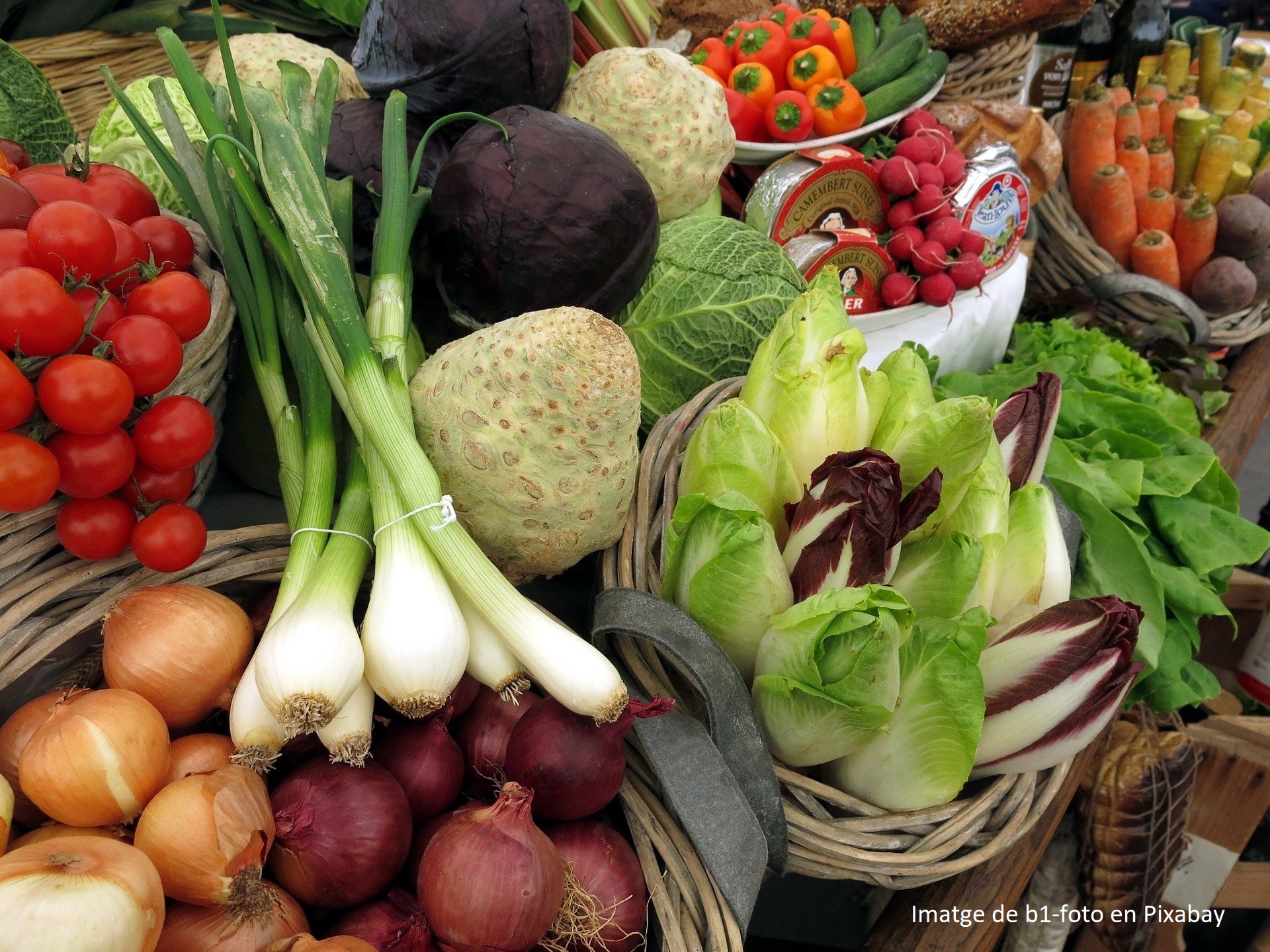In this programme you will find practical ways for moving towards a diet that includes habits which improve quality of life for ourselves and the people around us.
You learn how this affects our decisions, how we choose what we buy and where we buy it, all in a cheerful, fun and creative way.
We discover how to improve our surroundings and our inner selves, in order to feel full of life.
Our food choices have an impact on the environment; we review various diets (carnivorous, omnivorous and vegetarian) and finally focus on the plant-based diet.
Sustainable Food Citizen Week
Video resum de la Setmana Ciutadana de l'Alimentació Sostenible 2021
The activities of the Sustainable Food Citizen Week
Sustainable Food Citizen Week provides an opportunity to understand the relationship between food habits and cross-cutting aspects such as the climate emergency, local economic development, culture, politics, social rights and health. A week dedicated to citizens, in which you will achieve knowledge, reflection and debate about the main issues of the following activities.
Gastronomic heritage
- October 18th - 18.00 HBetevé broadcastingTelevised cooking workshop
- October 19th - 18.00 HBetevé broadcastingTelevised cooking workshop
How can you adapt sustainable food to healthy living?
Batch cooking consists in cooking for the whole family and investing a little time so you can make nutritious everyday meals, at home and for your lunch box.
BREAKFAST: habits as simple as a good glass of water, with sea water and lemon. Breakfasts such as shakes or smoothies, which you can warm up in winter. You will discover recipes such as rice pudding and pear, quality-bread sandwiches and an omelette made from organic eggs.
LUNCH: important notions on how to structure a dish with different groups of foods. A dish is not the same for a teenager as a middle-aged person. You can cook the same for all the family but put in what each person needs. You should always add vegetables in season, wholemeal carbohydrates, some raw vegetables, sprouted and fermented foods, etc. You will discover recipes such as baked pumpkin with curry; lentils cooked with adobo, sprouted ... and seeds; chickpeas with prawns; wholemeal rice with mushrooms; and lettuce head salad with carrot, olives and chopped chives. Wholemeal pasta with courgettes, mushrooms, squid with carrot and beetroot.
EVENING MEAL: an evening meal or supper should be light and eaten as early as possible. You will discover recipes such as pumpkin, sweet potato and oatmeal soup; vegetable pudding with carrot and broccoli; fish soup with noodles, and grilled fish in a sauce.
- October 20th - 18.00 HBetevé broadcastingTelevised cooking workshop
Getting children away from processed food as much as possible.
At home, we can organise menus very quickly, using fresh and seasonal local produce.
Not forgetting breakfasts and snacks and their natural desire for sweet food; we offer some great solutions.
Waste vs Good use
- October 22nd - 18.00 HBetevé broadcastingTelevised cooking workshop
A chef and an expert in better food use provide advice and useful tips for making the best use of food in cooking. Using the preparation of various recipes as a common thread, the programme introduces concepts that show the importance of sustainable, healthy food and ideas that help to prevent food waste, through everyday consumer and cooking habits.
Urban rurality and biodiversity
- October 19th - 19.00 HVideoconferenceWorkshop, Online
Virtual session offering advice and answering questions about the value of seasonality: food production and distribution models, urban garden planning, and strategies for preserving and extending the availability of products.
Not sure what to do with all the tomatoes you pick from the garden in the summer? Wondering how come you can buy tomatoes from the market all year round? In this session, we will look at the calendar and highlight the seasonal nature of horticultural produce. We will analyse the models of production and distribution of products in the agri-food industry and, at the same time, learn how to make a good plan for starting seeds and planting in our gardens, while discovering strategies for conserving and extending the availability of the products we grow throughout the whole year.This session relates to the following informational clip
- October 19th - 22.00 HBetevé broadcastingDocumentary film season
Seeds of Freedom (Llavors de llibertat) charts the story of seed, from its roots at the heart of traditional, diversity-rich farming systems across the world, to its transformation into a powerful commodity, used to monopolise the global food system.
The film explores the ways in which the industrial agricultural system, and genetically modified (GM) seeds in particular, have impacted upon the agro-biodiversity evolved by farmers and communities around the world over millennia.
The film challenges the mantra that large-scale, industrial agriculture is the only means by which we can feed the world, promoted by the pro-GM lobby. In tracking the story of seed it becomes clear how the corporate agenda has driven the take over of seed in order to make vast profit and take control of the global food system.
- October 20th - 17.30 HJardins de PedralbesVisit / Tour
A walk for discovering the many wild plants we have close to home that we were unfamiliar with and the varied possible uses of which we could never have imagined. We’ll learn how to identify them, we’ll smell and taste them and discover the uses each of the species has inside and outside the kitchen.
Ecological footprint
- October 16th - 18.00 HPlaça ReialTalk
Discussion on unsustainable fishing and its impact. What are the consequences of not fishing in our seas? We’ll be meeting up to discuss the impact that international fishing agreements are having and the advantages to local fishing. We will also find out how West Africa's coastal populations are facing over-exploitation of their maritime resources and what local-fish initiatives we have in Barcelona.
- October 17th - 11.00 H (Plaça del Rei) and October 23th - 10.00 H (Pl. de les Glòries Catalanes, next to the Disseny HUB BarcelonaPlaça del Rei, Plaça de les Glòries Catalanes, next to the Disseny HUB BarcelonaWorkshop
After receiving a brief introduction on climate change and its connection with our food system, everyone attending will be able to calculate the environmental footprint their food generates.
- October 17th - 12.00 HPlaça del ReiWorkshop
A workshop on low energy consumption cooking, to provide ideas and tips for cooking while using as little energy as possible. Tackling the problem in a practical way, we encourage reflection on better food-use cooking and healthy, sustainable food. The workshop aims to provide participants with viable tools for furthering their commitment to reducing the environmental impact of their food, opting for simple, but transformative, solutions. The workshop's objective, through various demonstrations as well as practical and theoretical advice, is to apply this in everyday life. It also fosters the culture of better food use and a complete, balanced diet. The workshop includes an explanation from an expert and the live preparation of various recipes.
Proximity
- 14-24 October, all daySustainable Food Week Social Media, Screens of the muncipal marketsExhibition
In order to spark an interest in local and seasonal cuisine among the younger generations, an activity designed for kids was carried out, which consisted of creating a piece of artwork about the origins of food.
Through a fun and creative activity, based on the collage technique, boys and girls from the Barcelona Metropolitan Area created a set of landscapes from the ingredients used to make different recipes. A collective imaginary, which introduced young children, in a playful, experimental and creative way, to the knowledge about our gastronomic culture, and at the same time, taught them the value of a healthy and sustainable diet.
The art work can be seen on the Sustainable Food Week social media and also on the different screens set up at the different municipal markets.
- Idea and concept: curation team for the Sustainable Food Citizen Week.
- With the collaboration of Marta de los Pájaros and Fundesplai.
- October 14th - 19.30 HPlaça de Sant JaumeShow
The start off the week will be a chorus, musical, and participative. Having their say will be the real heroes of sustainable food, those involved in the food cycle: the fishermen, drivers, chefs, farmers, ranchers, market vendors. The speech will be intertwined with the large mechanical orchestra of Cabo San Roque, distributed in the form of a sound mural in front of the City Hall, along with the active participation of the public, in a collective musical creation composed especially for the occasion. A show that highlights all the participants behind the food supply network and gives them a voice.
- Scenography and musical composition: Cabo San Roque
- Stage direction and coordination: Edi Pou
- Idea and concept: Virginia Angulo / Martín Garber
- October 16th from 13.00 to 14.00 HPlaça ReialShow
Agroecology and family circus show.
“The land is full of plastic and GMOs and agrochemicals are threatening us. Luckily, we have an endangered species called Pagès… ”
More week
- October 15th from 16.00 to 17.30 HEspai Consum ResponsableTalk, Exhibition
An activity aimed at raising public awareness of the resources used in food production, in order to show the importance of avoiding food waste due to the losses it generates.
- October 15th from 17.00 to 19.00 HCETT-UBCulinary experience
Presentation of the #CookOnceEatTwice campaign, with a view to sharing recipes and tips for getting the most out of your ingredients as a way of contributing to sustainable eating at home. The event will include a showcooking demonstration by the CETT-UB, where some of the recipes included in the campaign will be prepared.
La Fundació Espigoladors will be taking take part, with a question and answer game on making the most of food. - October 15th from 18.00 to 19.00 HVideoconferenceOnline
In this 60-minute talk we explain the pros and cons of using packaging for the retail sale of fruit and veg, and you’ll see that, in some cases,not only does it not represent an improvement in terms of food safety, but quite the reverse.





















